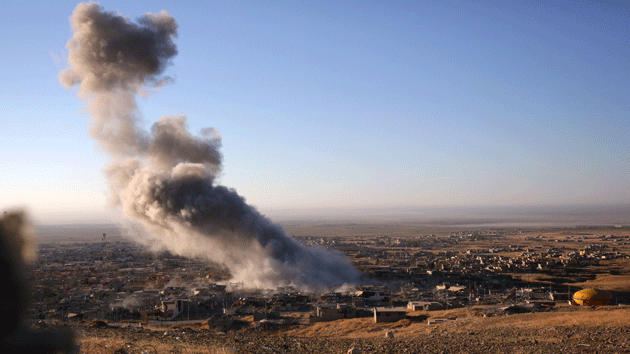
Smoke rises from the Syrian city of Kobani following an airstrike by the US-led coalition in November 2014.Vadim Ghirda/AP
Suspected airstrikes by the United States-led coalition in Syria recently killed at least 56 civilians, including 11 children, according to the British-based Syrian Observatory for Human Rights. The death toll from airstrikes targeting two villages near the Islamic State-controlled city of Manbij could be as high as 200, which would make it the coalition’s deadliest attack in two years.
In an interview with the non-profit journalism outlet Syria Direct on Tuesday, a local citizen journalist said the school housed displaced people and that 124 dead had been counted so far. A day earlier, 21 people were killed in raids also believed to be carried out by coalition aircraft north of Manbij. The airstrikes coincided with a ground offensive launched by ISIS against the US-backed Syria Democratic Forces, according to the New York Times.
In a statement, Amnesty International stated that the United States needs to do more to prevent civilian casualties. “The bombing of al-Tukhar may have resulted in the largest loss of civilian life by coalition operations in Syria,” said Magdalena Mughrabi, Amnesty’s interim deputy director of the Middle East and North Africa Program. “There must be a prompt, independent and transparent investigation to determine what happened, who was responsible, and how to avoid further needles loss of civilian life. Anyone responsible for violations of international humanitarian law must be brought to justice and victims and their families should receive full reparation.”
United States Central Command (CENTCOM) has not commented on the latest reports of civilian deaths. The Pentagon’s estimates of civilian casualties from its anti-ISIS campaign have long been at odds with those of reputable monitoring groups.
















